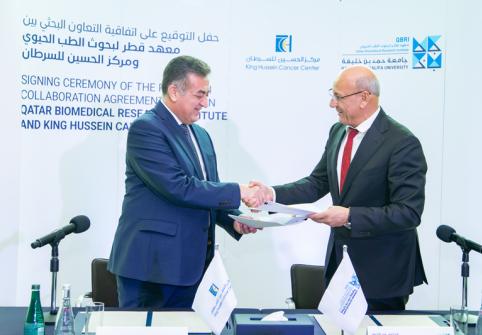News
HBKU’s QBRI Signs Landmark Research Agreement to Accelerate Developments in Cancer Diagnostics and Treatment
26 Nov 2018
Qatar Biomedical Research Institute (QBRI), part of Hamad Bin Khalifa University (HBKU), and the King Hussein Cancer Center (KHCC) in Jordan will work together to help accelerate cancer research in the region. This collaboration was underscored through the signing of an important research agreement between the two entities this month.
In attendance were Dr. Omar El Agnaf, acting executive director of QBRI; Dr. Asem Mansour, director general of KHCC; and Dr. Richard O’Kennedy, vice president for research, development and innovation at Qatar Foundation and Vice President for Research at HBKU.
Highlighting the importance of this agreement, Dr. El Agnaf said: “This agreement between QBRI and KHCC will bring together many teams of accomplished researchers and clinicians with aligned ambitions, skills, and objectives. It also allows both institutions to benefit from complementary research assets and immediate access to different populations. Over the next five years, we hope that this symbiotic relationship will help us deliver innovative breakthroughs that better address this pressing healthcare challenge and have regional and worldwide resonance.”
Dr. Mansour stated: “Our collaborative agreement with QBRI is a significant milestone in cancer research at the regional level. We are excited to see teams from our institutions combining expertise to deliver cutting-edge translational research and generate quality oncology-specific scientific content from the region.”
QBRI’s research capabilities will play a significant role in the collaborative research conducted. The all-encompassing agreement ushers in new techniques and methodologies in cancer-related research. The agreement includes (but is not limited to) sharing research data with KHCC regarding new diagnostic and predictive biomarkers for breast cancer, potential novel biomarkers for cancer patients with diabetes, and the detection of circulating tumor cells and protein biomarkers in the plasma of patients with early-stage cancer.
QBRI aims to improve and transform healthcare through innovation in the prevention, diagnosis, and treatment of diseases. In 2017, the institute won the prestigious Best Arab Research Institute Award in recognition of its efforts in biomedical research.
KHCC is one of the leading cancer centers in the region, with more than 52,000 patients receiving treatment there since the turn of the century. These include an increasing number from the GCC, in addition to many others from conflict-stricken countries around the region who also benefit from the invaluable support provided by KHCC.
Prior to this agreement, QBRI’s biomedical research teams have been working on the development of novel biomarkers, and diagnostic and therapeutic strategies for many diseases. Partnerships are fundamental to the institute’s day-to-day endeavors as QBRI works with pharmaceutical giants including Lundbeck and AFFiRiS, as well as the Harvard Stem Cell Institute on an international level. Nationally, QBRI has collaboration with key players in the healthcare fields such as Hamad Medical Corporation, Sidra Medicine and the Shafallah Center.
As a disease-focused institute, QBRI operates three primary scientific centers of excellence: the Cancer Research Center, Diabetes Research Center, and the Neurological Disorders Research Center. These centers concentrate on applying integrative and multidisciplinary approaches to provide insights into many diseases.
HBKU is dedicated to research that carries impact and relevance locally, regionally, and internationally. It was founded on four foundational pillars of Excellence, Innovation, People, and Partners, all of which are fundamental to its direction to providing an inclusive and creative learning environment.
